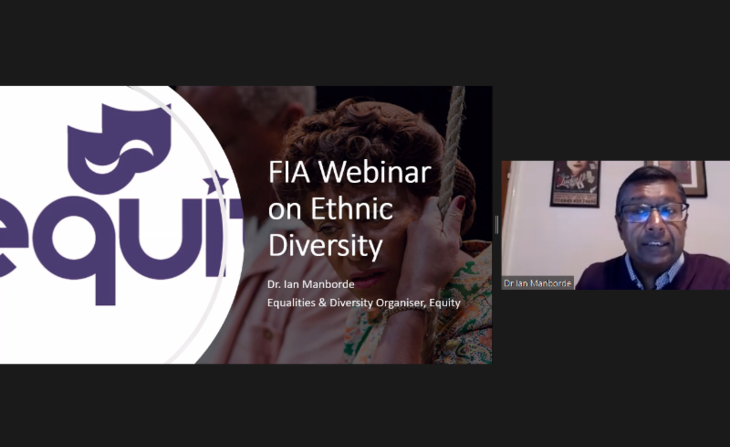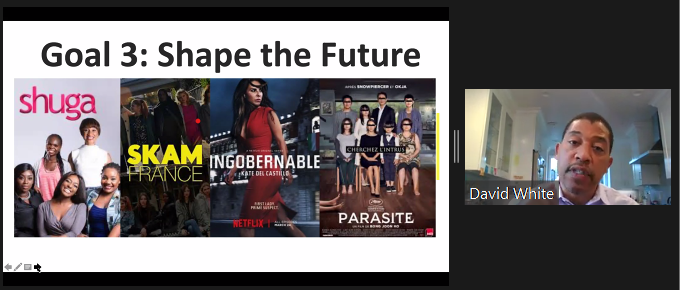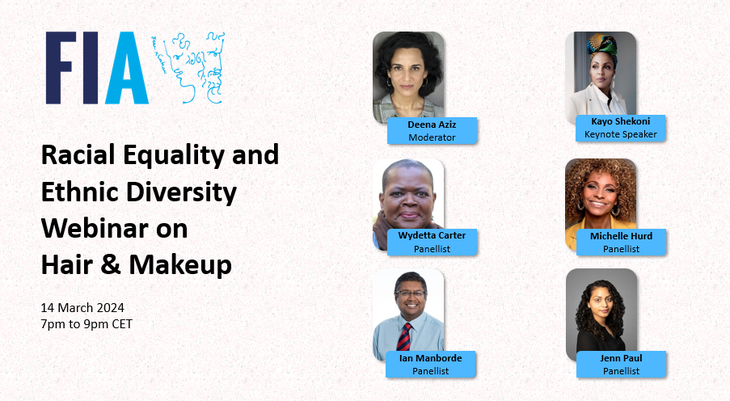In light of the current global fight for racial justice, FIA has decided to organise a series of webinars discussing the staggering under-representation of people of colour on stage and screen. Despite a reputation for openness and inclusion, the live performance and audiovisual industries still face a chronic lack of ethnic diversity with available roles for non-white performers often limited and limiting. With this series of webinars, we wish to bring our global membership together to share experiences and best practice on how to make our industry more diverse and representative of our societies.
In this first webinar (co-organised with SAG-AFTRA), FIA chose to give the floor to three unions particularly active in the fight for greater diversity in our sector: CAEA, Equity UK and SAG-AFTRA. The online event took place on 14 October 2020 and gathered over 50 participants worldwide.
The event started with a keynote speech by David White, National Executive Director and Chief Negotiator for SAG-AFTRA. White commented on the current #BlackLivesMatter movement in the United States and globally and stressed the important role our industry has to play in breaking habits and bias by telling the stories of under-represented groups and helping to fight discrimination.
Katja Holm, FIA Vice-President and moderator for the Webinar then introduced the panellists and gave the floor first to Dr. Ian Manborde (Equalities and Diversity Organizer, Equity UK). Dr. Manborde explained that the #Blacklivesmatter movement in the UK has coincided with a resurgence in casework for the union: now members do speak-up, which highlights their previous reluctance to do so. The period of the lock-down and the health and economic crisis have unfortunately resulted in a massive resurgence in discrimination towards non-white, less represented ethnic groups in UK’s Film and TV work environments. Despite the political climate, there is room for hope, with new platforms, networks and union actions addressing the resistance against greater diversity on stage and screen. He then presented some concrete tools and ongoing campaigns, including improved monitoring tools, new schemes aimed at tackling racism (addressing, for example, poor and inappropriate hair and make-up for black or minority performers), and Equity’s Manifesto for Casting.
Next up was Ellen Huang, SAG-AFTRA’s Interim National Director of Equity & Inclusion. She started with optimistic words regarding the current political context and activism, as it brings new opportunities for content creators to address the glaring inclusion and diversity problem in the industry. She then presented some of the work and tools developed by SAG-AFTRA’s Equity and Inclusion department. The team provides expert information and resources for any complaint processes (the union has negotiated non-discrimination and equal opportunity clauses in contracts and collective bargaining). The department also develops diversity content and training for employers and members. This includes an impressive number of diversity committees, over a 120 dedicated programmes and active collaboration with film festivals and networks promoting visibility of all underrepresented ethnic groups (including African-American, Native American, Asian-American, Latino and Spanish-speaking performers).
Deena Aziz, Member of the National Council of Canadian Actors Equity, started her presentation by sharing some results of the 2015 Canadian Equity Census on Black, Indigenous, and People of Colour (BIPOC) members. The impressive turnout (over 56% response rate) confirms the high interest in racial diversity and offers clear and irrefutable data on lack of racial justice and inclusion in the sector. The most striking results reveal BIPOC members have lower earnings and daily fees, as well as less favourable types of contracts. Aziz then outlined strategies such as negotiations and collective agreements to address under-representation in hiring and supporting artists. Some examples of what CAEA has been working on in new agreements with employers include obtaining a commitment from both parties to pursue anti-discrimination and oppression actions (which improves accountability and increases the safety of the workers); working on auditions to get more people through the door (not just for performers but also crews, leadership etc.); articulate terms about cultural integrity and respect; recommendations about external consultation and collaborations.
The panel presentations were followed by a Q&A session from the attendees to the panelists. As announced in the conclusions of the event, FIA will be organising further webinars on ethnic diversity in the future. More information will be made available on the FIA website in the coming weeks.








